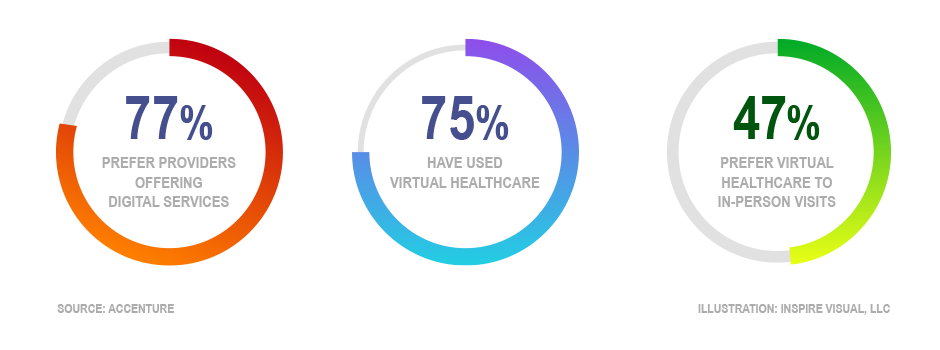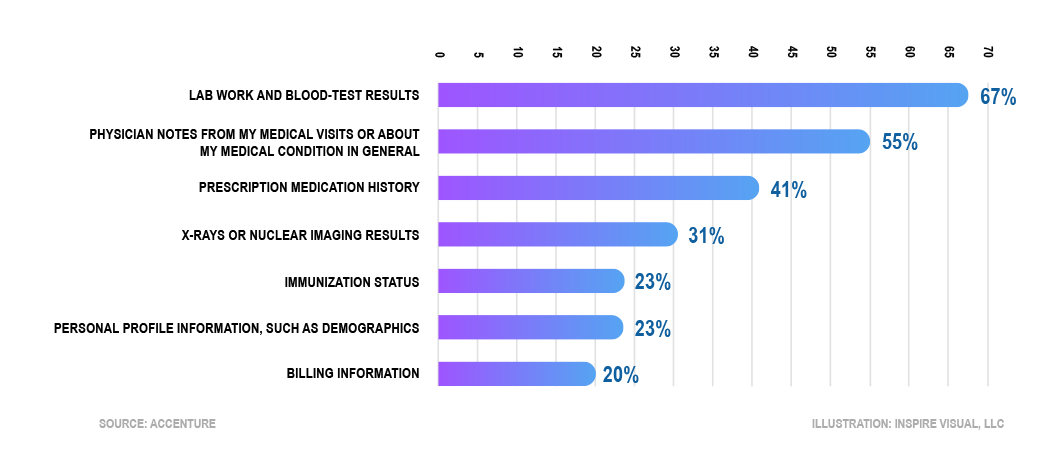With the Covid-19 pandemic still affecting people’s lives worldwide, the need for a good healthcare provider app to follow up on continued care is more relevant than ever.
By Mikael Frederiksen
According to statistics there are almost 54,000 iOS healthcare apps in the Apple App Store. In the Google Play store there are a little over 53,000 Android healthcare apps.
Today, healthcare is among the fastest-growing industries due to its direct impact on our daily lives. Based on the app store numbers there are already a wide selection of mobile apps that provide healthcare services across a gamut of services.
That would, reasonably, make you wonder whether there is a need for one more medical app in the market and if it’s worth the investment.
Having experience with developing healthcare apps, we’ll be able to share our experience so you can make an informed decision if owning a healthcare app is right for you.

What does the current healthcare app market look like?
Based on the current state of the healthcare app market, there’s room for improvement in two major areas; patient outreach and an outdated healthcare model.
Patient Outreach
Millennials (1981 – 1996), Generation Z (1997 – 2012) and Generation Alpha have all grown up being comfortable in the digital world. As these and new generations grow older, the demand and expectations of digital solutions keep demand for better digital care rise.
Healthcare providers are still mostly run by an older generation not as familiar with digital technology, and therefore used to the traditional methods of doctor vs. patient communication.
That results in dissatisfaction with the difficulty accessing their patient care program, medical records, lab results and scheduling or cancelling appointments – in short they require convenience.

Virtual Healthcare Popularity
A study from Accenture shows that more than half of patients expect their medical healthcare to be digital based. In fact, 77% are more likely to choose a practitioner offering digital services which goes to show there’s a big reason to make a healthcare app.
The need to transform the outdated healthcare model
The outgoing healthcare model has depended on phone calls, fax machines, receptionists and nurses to keep you in the know, but that is all changing, especially boosted by the last couple of years’ necessity for staying home due to Covid-19.
The incoming model offers more transparency to the entire patient experience. From the moment a patient books an appointment, the choice of being able to meet in office or via tele-medicine (a consultation happening remotely via webcam), to accessing treatment plans and consultation logs.
For care providers willing to embrace the new model and develop a custom health-related app there are plenty of convenience factors to include and app types to develop.
The two types of healthcare apps
Healthcare apps are usually either made for patients or healthcare providers. Often these two are built at the same time and connected for a seamless patient/provider experience. They each usually offer different features targeted at the user.
Patient apps
This app often includes the convenience parameters to manage their health, like appointment scheduling, access to medical records, lab results, messaging center to contact medical staff, recaps of physician notes, tele-medicine and vital statistics.
Healthcare provider apps
The healthcare market is much more segmented than the patient requirements, however many of the following features are overlapping and included in a healthcare staff facing app: patient notes, appointment calendar for scheduling/rescheduling, messaging center to patients and other medical professionals, medicine lookup, tele-medicine and prescription ordering.
Before you build an app you need to consider which parameters you prioritize and whether you want to build one for your patients and/or for in-house staff. That lays the groundwork for an app agency to bid on your project with the most accurate estimate based on your expectations.

Most Helpful Electronic Health Records Information
Medical app challenges
The medical field deals with very personal information on a daily basis and as a result are heavily regulated to protect the patient’s privacy. That can also prove to be a challenge to a reputable app development agency or a showstopper to a poorly run app development company.
Because of this it’s important not to mainly focus on cost, but more on the quality and track record of the company you are going to work with. While they can’t necessarily be experts in the field, it helps to work with a company who has developed healthcare apps previously.
Some of the regulations that must be met in the U.S. are the Health Insurance Portability and Accountability Act (HIPAA), the Health Information Technology for Economic and Clinical Health (HITECH), and Freedom of Information Act & Privacy Act (FOIA and ASPA).
You need to work together with the app development company to find out if any third-party integrated tools are in violation of any of these laws and regulations. For example, a teleconference provider might not meet the security requirements needed for encryption or the payment provider for protecting the patient’s privacy thus violating the HIPAA.
How much do you need to spend to have a healthcare app built?
Even though you shouldn’t base your decision on price alone, it’s of course an important parameter. The app cost should fit within your budget while still providing a safe and convenient experience for its users.
The cost is based on many factors and a fixed price tag is not an option for a medical app or any app for that matter.
First you need to consider what the must-have features are and which nice-to-have features you would like to include. If budget is a concern, be flexible when you discuss the app with your app developer. You may have to give up some features in the first version of the app, but plan for including it in a later revision when a new budget year arrives.
Which platforms you are targeting also matter. Android and iOS users are about 50/50 in the US, but if you are targeting other demographics it may be different. A good app agency can help you make a decision on which platform to target based on the target location. And if the target users are in the US, you can even make a cross-platform compatible app that is one app source code that will work on both Android and iOS devices simultaneously.
Healthcare apps in general are more advanced with multiple backend integrations, both with medical facility databases and third-party databases, so it’s not unlikely to expect about a year of development and a price tag in the 6-digits.
However, the ROI from 77% of patients choosing the digital offered medical institutions coupled with increased satisfaction, efficient cost-saving working methods and less patient abandonment is worth the one-time investment.

Michael Frederiksen
Michael earned degrees in computer and business science, later graduating with top scores from Denmark’s prestigious multimedia program. His specialties include experimenting with digital technologies, creative direction, web and mobile app UI/UX design and is the co-founder of Inspire Visual.
Share this article on
